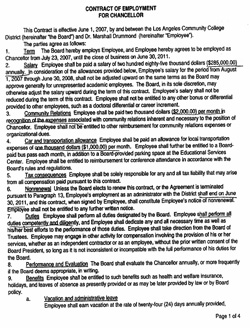The Mysterious Departure Of Marshall Drummond

Questions abound about $428,000 giveaway to Marshall Drummond.
(L.A. City College)
Board members won't say why they paid the Los Angeles Community College chancellor $428,000 to leave office.
In July, the seven-member board of the Los Angeles Community College District paid then-Chancellor Marshall Drummond nearly a half-million-dollars to quietly leave office.
Neither Drummond nor the board cited any reasons, saying they were bound by confidentiality rules and a clause in the severance pact that forbid either side from discussing the matter.
The sudden and puzzling departure of the high-profile career educator, who once oversaw the entire 110-campus California community college system, drew a short piece buried inside the Los Angeles Times, before vanishing from the media radar.
For the past three weeks, Neon Tommy sought to reopen this issue and pry loose the exact reasons that led Drummond and the board to part ways with two years remaining on his contract. None of the board members would budge and reveal any of their reasoning that led to Drummond's $428,750 severance.
The board's penchant for secrecy angered open-government advocates.
"We are in such dire financial straits that the public is owed an explanation why this was given to him," Bob Stern, president of the nonpartisan Center for Governmental Studies said.
|
The Elected Seven-Member L.A. Community College Board of Trustees:
Among the questions posed to the board by Neon Tommy:
1) Was the $428,750 payout given to Marshall Drummond contractually obligated? If so what provision?
2) Who, the Board of Trustees or Chancellor Drummond, initiated the process of his resignation?
3) Why may the board cite confidential personnel issues in refusing to answer questions over Chancellor Drummond's departure?
4) How can taxpayers evaluate whether you're spending their money properly if you won't tell them what prompted you to give your chancellor nearly a half million dollars to leave before his contract was up?
5) How would you explain your reasons for paying Chancellor Drummond nearly a half million dollars to students and teachers who've seen classes cut and the general state of public education deteriorate throughout the community college district? |
Board President Mona Field declined to comment on the reasons and when asked how the public should know whether she and the board acted in the best interest of taxpayers, she referred to a vague, incomplete press release available online.
"No comment except what is available online," Field said. "We do not release to anyone anything on an employee, period."
Neon Tommy addressed a formal e-mail to all board members, seeking to understand their rationale for secrecy at a time of tumultuous budgets.
One of the six questions: How can taxpayers evaluate whether you're spending their money properly if you won't tell them what prompted you to give your chancellor nearly a half million dollars to leave before his contract was up?
None of the board members responded to the e-mail.
In our quest for a full airing of the reasons for Drummond's departure, Neon Tommy sought the guidance of Terry Francke, the general counsel for Californians Aware, a nonprofit that advocates for public information.
Francke reviewed the three-page severance agreement, and analyzed the clause banning either side from commenting on the reasons from the chancellor's calling it quits.
Francke also examined Drummond's original, four-page job contract and the paragraphs setting out in general terms how much it would cost the district if he did not serve his full, four-year term.
The unexpected departure of a high-level official, such as Drummond, is in the "highest public interest," Francke said. "If people are indifferent to why top government officials appear and disappear then we can't hold out much hope for self-government."
Drummond himself appears to have moved on with his life. He took a $1,200-day consulting job at the Peralta Community Colleges, and issued a report that ironically chided the Northern California system for lack of transparency in addressing questions about board members' lavish travel budget and the chancellor's salary details. Drummond recently accepted a post in the United Arab Emirates, where he is chief operating officer and provost at the Higher Colleges of Technology. In an e-mail exchange, he refused to discuss details of his leaving.
Francke said the board members can withhold the reasons for Drummond's exit if they can be deemed to be medical or personal. However, the board's refusal to comment makes it impossible for the public to judge if those reasons existed.
The district's lawyer, Camille Goulet, rejected Neon Tommy's written requests for any documents pertaining to Drummond's leaving, citing confidentiality issues.

Read Marshall Drummond's contract and
separation agreement with the Los Angeles
Community College District.
Although he refused to state why he stepped down, Drummond said in an e-mail that his severance came out of negotiations that "were necessary on how exactly to break the terms of the contract and bring it to a mutually agreeable termination."
Because both parties mutually agreed to part ways, they had to enter into negotiations to break the contract, Francke said.
"[The board] was 'required to' [pay out] not by law but by the realities of negotiation," Francke said in an email. "If they wanted him to leave and say nothing about the reasons for his leaving or institute any legal proceedings against them, they had to meet his terms, with the government code as a ceiling."
The code limits how much an agency can give a departing employee. If more than 18 months remain on an employee's contract at the time of departure, the settlement cannot surpass 18 times the monthly salary. Drummond had two years remaining on a four-year contract.
However, other options may have existed. For example, if the board had cause to fire Drummond, it could have done so without paying him, Francke said. If no cause existed, board members could have faced legal action if they let him go without compensation, Francke said.
During a time of significant budget cuts, the board members' silence forces the public to trust that they responsibly spent taxpayer money on Drummond.
Tight budgets prompted the board to cancel the district's second 2009 summer session.
Student fees have also risen statewide at community colleges from $20 per unit to $26 per unit.
Overall, California Community Colleges received 10.4 percent less from the state general fund in 2009-10, compared to the 2007-08 budget, according to a report from the nonpartisan Legislative Analyst's Office.
Marcia Fritz, president of the California Foundation for Fiscal Responsibility called the board's handling of the matter "outrageous" and said Drummond's severance shows the need to reform how public employee contracts, especially those of top officials, are negotiated and voted upon.
"[Labor contracts] are negotiated away from public view without any independent oversight function," she said, "setting the public up for huge debt if conditions deteriorate."
Drummond champions transparency
Drummond first served as chancellor of the L.A. community colleges from 1999 to 2004, when he left to run the California Community College system. He returned as chancellor in Los Angeles in 2007 and stayed until he unexpectedly took a leave of absence in June.
Two months ago, in his stint as a consultant in Peralta, Drummond expressed the importance of public agencies conducting their business in the open.
Stories published in July by the Bay Area News Group raised questions about travel spending by Peralta board members and the chancellor's $300,000 salary. On July 29, California Community College Chancellor Jack Scott recommended Drummond to the Peralta district for the job of conducting a third-party review of these issues.
In presenting his findings to Peralta board members on Sept. 15, Drummond admonished them for failing to be more transparent when it came to providing details about the chancellor's compensation.
Said Drummond at the meeting: "There's just a lot of unclarity. So, that leads to people being skeptical and, if they don't understand it, they think there's something wrong with it."



